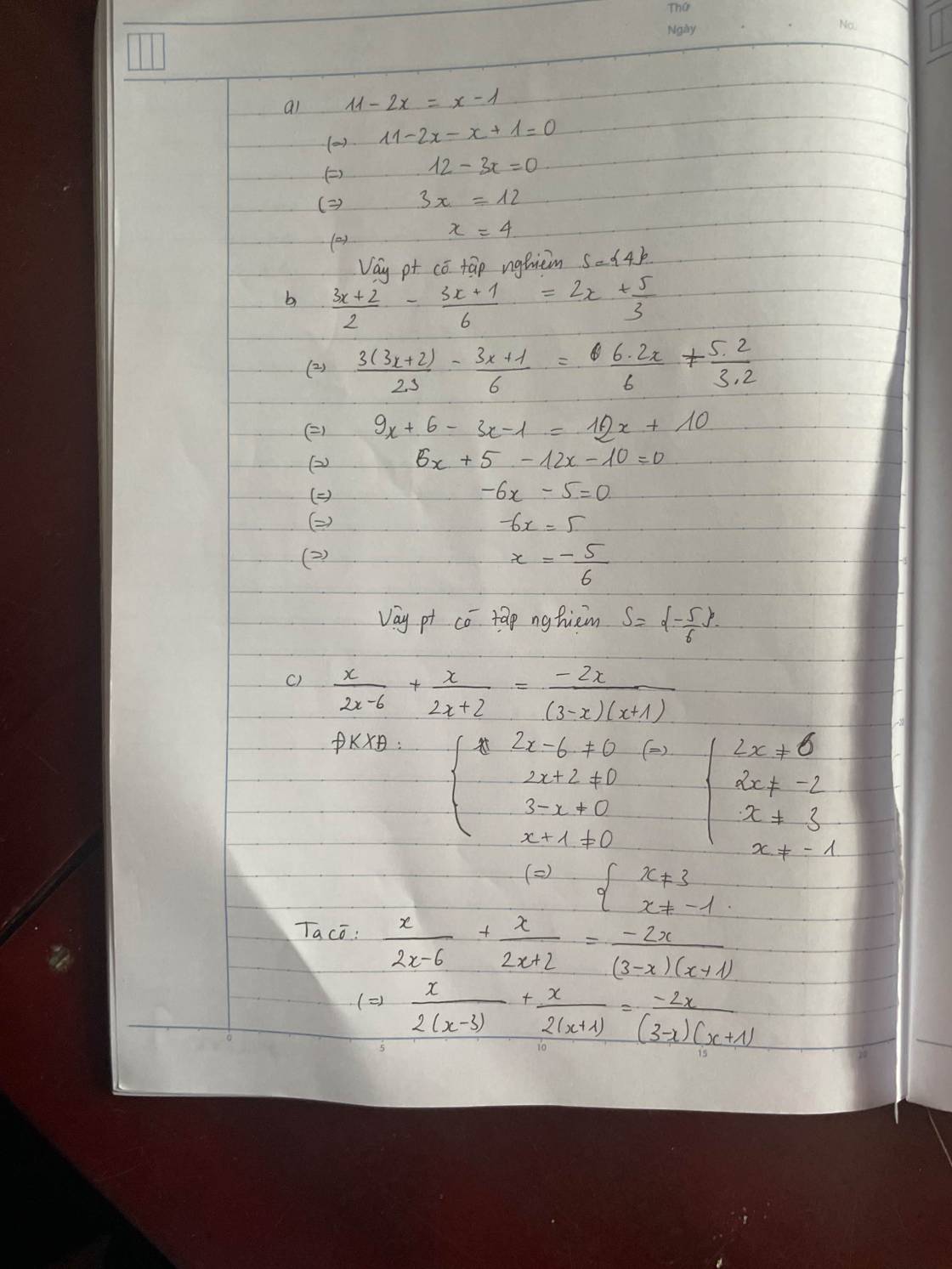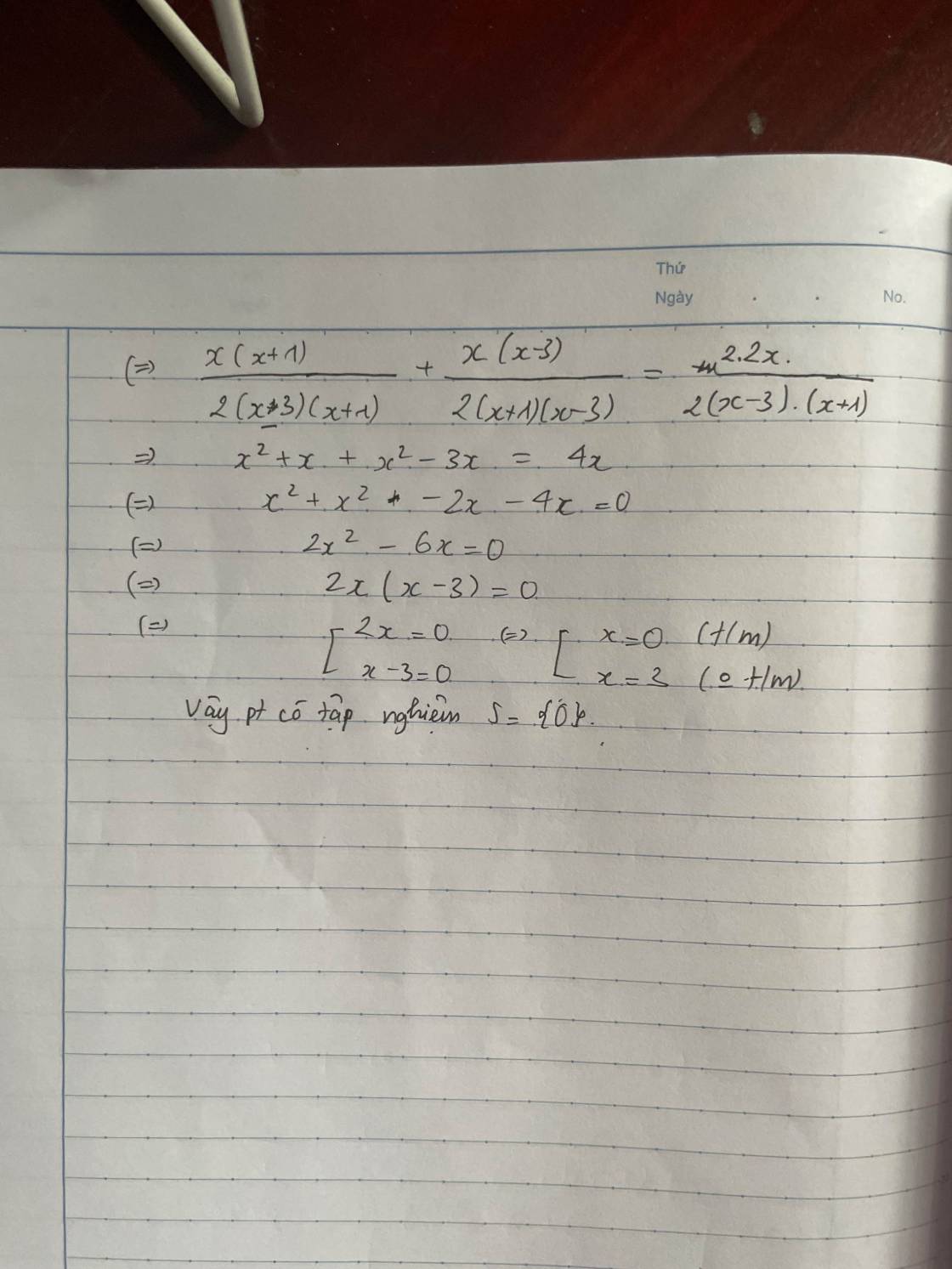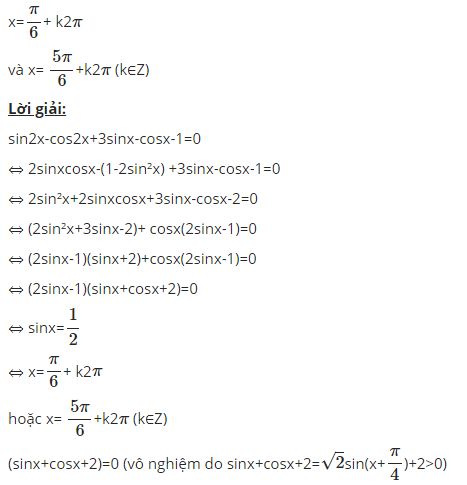Chuyển từ \(\dfrac{2}{cos^2x}\) sang \(2\left(tan^2x+1\right)\). Giải chi tiết.

Những câu hỏi liên quan
mọi người giải chi tiết dùm e 3 bài này với
a) \(2cosx-3sinx+2=0\)
b) \(\dfrac{1+sinx}{1+cosx}=\dfrac{1}{2}\)
c) \(cos\left(2x-15^0\right)+sin\left(2x-15^0\right)=-1\)
a ) \(2cosx-3sinx+2=0\)
\(\Leftrightarrow2cosx-3sinx=-2\)
\(\Leftrightarrow\dfrac{2}{\sqrt{13}}cosx-\dfrac{3}{\sqrt{13}}sinx=-\dfrac{2}{\sqrt{13}}\)
Thấy : \(\left(\dfrac{2}{\sqrt{13}}\right)^2+\left(\dfrac{-3}{\sqrt{13}}\right)^2=1\) nên tồn tại \(\alpha\) t/m :
\(sin\alpha=\dfrac{2}{\sqrt{13}};cos\alpha=\dfrac{-3}{\sqrt{13}}\) . . Khi đó : \(sin\alpha.cosx+cos\alpha.sinx=\dfrac{-2}{\sqrt{13}}\)
\(\Leftrightarrow sin\left(\alpha+x\right)=\dfrac{-2}{\sqrt{13}}\) ( p/t cơ bản )
Đúng 1
Bình luận (0)
b ) \(\dfrac{1+sinx}{1+cosx}=\dfrac{1}{2}\) ( ĐK : \(cosx\ne-1\Leftrightarrow x\ne\left(2k+1\right)\pi\) ; ( k thuộc Z ) )
\(\Leftrightarrow2+2sinx=cosx+1\) \(\Leftrightarrow cosx-2sinx=1\)
Làm giống như a )
Đúng 0
Bình luận (0)
c ) \(cos\left(2x-15^o\right)+sin\left(2x-15^o\right)=-1\)
Đặt \(t=2x-15^o\) ; ta có : \(cos t + sin t = -1\)
\(\Leftrightarrow\sqrt{2}sin\left(t+\dfrac{\pi}{4}\right)=-1\) \(\Leftrightarrow sin\left(t+\dfrac{\pi}{4}\right)=sin\left(-\dfrac{\pi}{4}\right)\)
Xong rồi bn làm tiếp ; chú ý đổi ra độ
Đúng 0
Bình luận (0)
Cho 0o x 90o, CM các biểu thức sau không phụ thuộc vào biến:
1.A2left(sin^4x+cos^4x+sin^2xcos^2xright)^2-left(sin^8x+cos^8xright)
2.Bleft(dfrac{1-tan^2x}{tan x}right)^2-left(1+tan^2xright)left(1+cot^2xright)
3.Cleft(sin^4x+cos^4x-1right)left(tan^2x+cot^2x+2right)
4.Ddfrac{tan^2x-cos^2x}{sin^2x}+dfrac{cot^2x-sin^2x}{cos^2x}
5.Edfrac{cot^2x-cos^2x}{cot^2x}+dfrac{sin xcdotcos x}{cot x}
Đọc tiếp
Cho 0o < x < 90o, CM các biểu thức sau không phụ thuộc vào biến:
\(1.A=2\left(\sin^4x+\cos^4x+\sin^2x\cos^2x\right)^2-\left(\sin^8x+\cos^8x\right)\)
\(2.B=\left(\dfrac{1-\tan^2x}{\tan x}\right)^2-\left(1+\tan^2x\right)\left(1+\cot^2x\right)\)
\(3.C=\left(\sin^4x+\cos^4x-1\right)\left(\tan^2x+\cot^2x+2\right)\)
\(4.D=\dfrac{\tan^2x-\cos^2x}{\sin^2x}+\dfrac{\cot^2x-\sin^2x}{\cos^2x}\)
\(5.E=\dfrac{\cot^2x-\cos^2x}{\cot^2x}+\dfrac{\sin x\cdot\cos x}{\cot x}\)
câu 1 : ta có : \(A=\left(sin^4x+cos^4x+sin^2x.cos^2x\right)^2-\left(sin^8x+cos^8x\right)\)
\(=\left(1-sin^2x.cos^2x\right)^2-\left(1-3sin^2x.cos^2x\right)\)
\(=\left(1-sin^2x.cos^2x\right)^2-\left(1-sin^2x.cos^2x\right)+2sin^2xcos^2x\)
\(=-sin^2x.cos^2x\left(1-sin^2x.cos^2x\right)+2sin^2x.cos^2x\)
\(=sin^2x.cos^2x\left(1+sin^2x.cos^2x\right)\)
tới đây mk xin sử dụng kiến thức lớp 10 một chút
\(=\dfrac{sin^22x}{4}\left(1+\dfrac{sin^22x}{4}\right)=\dfrac{sin^22x}{4}+\dfrac{sin^42x}{16}\)
vẩn phụ thuộc vào x \(\Rightarrow\) đề sai .
Đúng 0
Bình luận (0)
câu 1 : câu này bn có thể tìm trong trang của mk , mk nhớ đã làm nó rồi nhưng tìm hoài không đc . nếu đc bn có thể chờ mk đi hok về mk sẽ kiếm cho bn hoắc có thể là lm lại cho bn nha :)
câu 2 : https://hoc24.vn/hoi-dap/question/657072.html
câu 3 : https://hoc24.vn/hoi-dap/question/657069.html
câu 4 : https://hoc24.vn/hoi-dap/question/656635.html
câu 5 : https://hoc24.vn/hoi-dap/question/657071.html
Đúng 0
Bình luận (4)
Giải phương trình:
\(Tan\left(\dfrac{\pi}{2}+x\right)-3Tan^2x=\dfrac{Cos2x-1}{Cos^2x}\)
Lời giải:
$\tan (\frac{\pi}{2}+x)-3\tan ^2x=\frac{\cos 2x-1}{\cos ^2x}=\frac{2\cos ^2x-2}{\cos ^2x}=\frac{2(\cos ^2x-1)}{\cos ^2x}$
$=\frac{-2\sin ^2x}{\cos ^2x}=-2\tan ^2x$
$\Leftrightarrow \tan (x+\frac{\pi}{2})=\tan ^2x$
Dễ thấy $\tan x=0$ không thỏa mãn nên $\tan x\neq 0$. Do đó pt $\Leftrightarrow \tan ^2x=\tan [\pi +(x-\frac{\pi}{2})]=\tan (x-\frac{\pi}{2})=-\tan (\frac{\pi}{2}-x)=-\cot x =\frac{-1}{\tan x}$
$\Rightarrow \tan ^3x=-1$
$\Rightarrow \tan x=-1$
$\Rightarrow x=\frac{-\pi}{4}+k\pi$ với $k$ nguyên.
Đúng 0
Bình luận (0)
Giải các pt sau:
a) \(\sin\left(3x+60^o\right)=\dfrac{1}{2}\)
b) \(\cos\left(2x-\dfrac{\pi}{3}\right)=\dfrac{-\sqrt{2}}{2}\)
c) \(\tan\left(x+\dfrac{\pi}{6}\right)=\sqrt{3}\)
d) \(\cot\left(2x+\pi\right)=-1\)
a, Ta có : \(\sin\left(3x+60\right)=\dfrac{1}{2}\)
\(\Rightarrow3x+60=30+2k180\)
\(\Rightarrow3x=2k180-30\)
\(\Leftrightarrow x=120k-10\)
Vậy ...
b, Ta có : \(\cos\left(2x-\dfrac{\pi}{3}\right)=-\dfrac{\sqrt{2}}{2}\)
\(\Rightarrow2x-\dfrac{\pi}{3}=\dfrac{3}{4}\pi+k2\pi\)
\(\Leftrightarrow x=\dfrac{13}{24}\pi+k\pi\)
Vậy ...
c, Ta có : \(tan\left(x+\dfrac{\pi}{6}\right)=\sqrt{3}\)
\(\Rightarrow x+\dfrac{\pi}{6}=\dfrac{\pi}{3}+k\pi\)
\(\Leftrightarrow x=\dfrac{\pi}{6}+k\pi\)
Vậy ...
d, Ta có : \(\cot\left(2x+\pi\right)=-1\)
\(\Rightarrow2x+\pi=\dfrac{3}{4}\pi+k\pi\)
\(\Leftrightarrow x=-\dfrac{1}{8}\pi+\dfrac{k}{2}\pi\)
Vậy ...
Đúng 1
Bình luận (0)
a) \(sin\left(3x+60^0\right)=\dfrac{1}{2}\)
\(\Leftrightarrow sin\left(3x+\dfrac{\pi}{3}\right)=sin\dfrac{\pi}{6}\)
\(\Leftrightarrow\left[{}\begin{matrix}3x+\dfrac{\pi}{3}=\dfrac{\pi}{6}+k2\pi\\3x+\dfrac{\pi}{3}=\dfrac{5\pi}{6}+k2\pi\end{matrix}\right.\)(\(k\in Z\))\(\Leftrightarrow\left[{}\begin{matrix}x=\dfrac{-\pi}{18}+\dfrac{k2\pi}{3}\\x=\dfrac{\pi}{6}+\dfrac{k2\pi}{3}\end{matrix}\right.\)(\(k\in Z\))
Vậy...
b) Pt\(\Leftrightarrow cos\left(2x-\dfrac{\pi}{3}\right)=cos\dfrac{3\pi}{4}\)
\(\Leftrightarrow\left[{}\begin{matrix}2x-\dfrac{\pi}{3}=\dfrac{3\pi}{4}+k2\pi\\2x-\dfrac{\pi}{3}=-\dfrac{3\pi}{4}+k2\pi\end{matrix}\right.\)(\(k\in Z\))\(\Leftrightarrow\left[{}\begin{matrix}x=\dfrac{13\pi}{24}+k\pi\\x=-\dfrac{5\pi}{24}+k\pi\end{matrix}\right.\)(\(k\in Z\))
Vậy...
c) Pt \(\Leftrightarrow tan\left(x+\dfrac{\pi}{6}\right)=tan\dfrac{\pi}{3}\)
\(\Leftrightarrow x+\dfrac{\pi}{6}=\dfrac{\pi}{3}+k\pi,k\in Z\)\(\Leftrightarrow x=\dfrac{\pi}{6}+k\pi,k\in Z\)
Vậy...
d) Pt \(\Leftrightarrow tan\left(2x+\pi\right)=-1\)
\(\Leftrightarrow2x+\pi=-\dfrac{\pi}{4}+k\pi,k\in Z\)
\(\Leftrightarrow x=-\dfrac{5\pi}{8}+\dfrac{k\pi}{2},k\in Z\)
Vậy...
Đúng 1
Bình luận (0)
Giải các phương trình :
a) cos^2x+cos^22x-cos^23x-cos^24x0
b) cos4xcosleft(pi+2xright)-sin2xcosleft(dfrac{pi}{2}-4xright)dfrac{sqrt{2}}{2}sin4x
c) tanleft(120^0+3xright)-tanleft(140^0-xright)2sinleft(80^0+2xright)
d) tan^2dfrac{x}{2}+sin^2dfrac{x}{2}tandfrac{x}{2}+cos^2dfrac{x}{2}+cot^2dfrac{x}{2}+sin x4
e) dfrac{sin2t+2cos^2t-1}{cot t-cot3t+sin3t-sin t}cos t
Đọc tiếp
Giải các phương trình :
a) \(\cos^2x+\cos^22x-\cos^23x-\cos^24x=0\)
b) \(\cos4x\cos\left(\pi+2x\right)-\sin2x\cos\left(\dfrac{\pi}{2}-4x\right)=\dfrac{\sqrt{2}}{2}\sin4x\)
c) \(\tan\left(120^0+3x\right)-\tan\left(140^0-x\right)=2\sin\left(80^0+2x\right)\)
d) \(\tan^2\dfrac{x}{2}+\sin^2\dfrac{x}{2}\tan\dfrac{x}{2}+\cos^2\dfrac{x}{2}+\cot^2\dfrac{x}{2}+\sin x=4\)
e) \(\dfrac{\sin2t+2\cos^2t-1}{\cot t-\cot3t+\sin3t-\sin t}=\cos t\)
Giải phương trình:
\(\left[1+cos\left(x+\dfrac{\pi}{2}\right)\right].tan^2x-cosx=1\)
Lời giải:
ĐKXĐ:.........
PT \(\Leftrightarrow (1-\sin x).\frac{\sin ^2x}{\cos ^2x}=1+\cos x\)
\(\Rightarrow (1-\sin x)\sin ^2x=\cos ^2x(1+\cos x)\)
\(\Leftrightarrow (\sin^2x-\cos ^2x)-(\sin ^3x+\cos ^3x)=0\)
\(\Leftrightarrow (\sin x+\cos x)[(\sin x-\cos x)-(\sin ^2x-\sin x\cos x+\cos ^2x)]=0\)
\(\Leftrightarrow (\sin x+\cos x)(\sin x-\cos x-1+\sin x\cos x)=0\)
\(\Leftrightarrow (\sin x+\cos x)(\sin x-1)(\cos x+1)=0\)
Đến đây thì đơn giản rồi.
Đúng 1
Bình luận (3)
Rút gọn các biểu thức sau
1, \(\dfrac{1+\cot x}{1-\cot x}-\dfrac{2+2\cot^2x}{\left(\tan x-1\right)\left(\tan^2x+1\right)}\)
2, \(\sqrt{\sin^4x+6\cos^2x+3\cos^4x}+\sqrt{\cos^4x+6\sin^2x+3\sin^4x}\)
Bạn kiểm tra lại đề bài câu 1, câu này chỉ có thể rút gọn đến \(2cot^2x+2cotx+1\) nên biểu thức ko hợp lý
Đồng thời kiểm tra luôn đề câu 2, trong cả 2 căn thức đều xuất hiện \(6sin^2x\) rất không hợp lý, chắc chắn phải có 1 cái là \(6cos^2x\)
Đúng 0
Bình luận (1)
Câu 1 đề vẫn có vấn đề:
\(=\dfrac{1+cotx}{1-cotx}-\dfrac{2\left(1+cot^2x\right)cot^2x}{\left(tanx-1\right)\left(tan^2x+1\right)cot^2x}=\dfrac{1+cotx}{1-cotx}-\dfrac{2cot^2x}{tanx-1}\)
\(=\dfrac{1+cotx}{1-cotx}-\dfrac{2cot^3x}{1-cotx}=\dfrac{1+cotx-2cot^3x}{1-cotx}\)
\(=\dfrac{\left(1-cotx\right)\left(1+2cotx+2cot^2x\right)}{1-cotx}=1+2cotx+2cot^2x\)
Có thể coi như ko thể rút gọn tiếp
2.
\(\sqrt{\left(1-cos^2x\right)^2+6cos^2x+3cos^4x}+\sqrt{\left(1-sin^2x\right)^2+6sin^2x+3sin^4x}\)
\(=\sqrt{4cos^4x+4cos^2x+1}+\sqrt{4sin^4x+4sin^2x+1}\)
\(=\sqrt{\left(2cos^2x+1\right)^2}+\sqrt{\left(2sin^2x+1\right)^2}\)
\(=2\left(cos^2x+sin^2x\right)+2=4\)
Đúng 0
Bình luận (0)
1) giải các phương trình:
a) 11-2x=x-1
b) \(\dfrac{3x+2}{2}\)-\(\dfrac{3x+1}{6}\)=2x+\(\dfrac{5}{3}\)
c) \(\dfrac{x}{2x-6}\)+\(\dfrac{x}{2x+2}\)=\(\dfrac{-2x}{\left(3-x\right).\left(x+1\right)}\)
GIẢI CHI TIẾT AH
a: =>-3x=-12
=>x=4
b: =>3(3x+2)-3x-1=12x+10
=>9x+6-3x-1=12x+10
=>12x+10=6x+5
=>6x=-5
=>x=-5/6
c: =>x(x+1)+x(x-3)=4x
=>x^2+x+x^2-3x-4x=0
=>2x^2-6x=0
=>2x(x-3)=0
=>x=3(loại) hoặc x=0(nhận)
Đúng 1
Bình luận (0)
Giải phương trình sau:
a, \(\sin\left(2x\right)+\sin\left(x\right)-\dfrac{1}{2\sin\left(x\right)}-\dfrac{1}{\sin\left(2x\right)}=2\cot\left(2x\right)\)
b, \(\left(\sin\left(2x\right)+cos\left(2x\right)\right)cos\left(x\right)+2cos\left(2x\right)-sin\left(x\right)=0\)
c, \(\sin\left(2x\right)-\cos\left(2x\right)+3\sin\left(x\right)-\cos\left(x\right)-1=0\)
b)
(sin2x + cos2x)cosx + 2cos2x - sinx = 0
⇔ cos2x (cosx + 2) + sinx (2cos2 x – 1) = 0
⇔ cos2x (cosx + 2) + sinx.cos2x = 0
⇔ cos2x (cosx + sinx + 2) = 0
⇔ cos2x = 0
⇔ 2x =  + kπ ⇔ x =
+ kπ ⇔ x =  + k
+ k (k ∈
(k ∈  )
)
Đúng 0
Bình luận (0)
c)
Đáp án:
x=π6π6+ k2ππ
và x= 5π65π6+k2ππ (k∈Z)
Lời giải:
sin2x-cos2x+3sinx-cosx-1=0
⇔ 2sinxcosx-(1-2sin²x) +3sinx-cosx-1=0
⇔ 2sin²x+2sinxcosx+3sinx-cosx-2=0
⇔ (2sin²x+3sinx-2)+ cosx(2sinx-1)=0
⇔ (2sinx-1)(sinx+2)+cosx(2sinx-1)=0
⇔ (2sinx-1)(sinx+cosx+2)=0
⇔ sinx=1212
⇔ x=π6π6+ k2ππ
hoặc x= 5π65π6+k2ππ (k∈Z)
(sinx+cosx+2)=0 (vô nghiệm do sinx+cosx+2=√22sin(x+π4π4)+2>0)
Đúng 0
Bình luận (0)


























